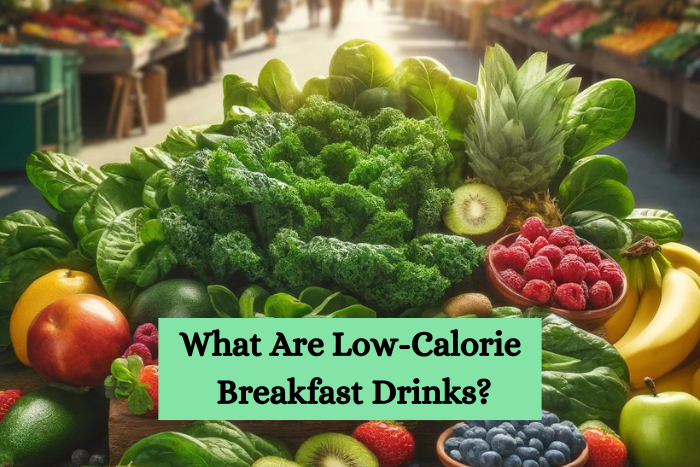- Reading Labels for Better Choices: When selecting ingredients or pre-made drinks, it’s essential to read labels to avoid added sugars and artificial additives.
- Nutritional Benefits of Fresh Ingredients: Utilizing fresh fruits and vegetables in your drinks ensures maximum nutritional benefits.
- Importance of Homemade Preparation: Making drinks at home allows you to control the quality and quantity of ingredients, ensuring they align with your health goals.
- Smart Additions Enhance Health Benefits: Adding supplements like protein powder or a fiber supplement to your drinks can boost their health benefits without significantly increasing calorie counts.
- Continuous Nutritional Education: Staying informed about the nutritional content and health benefits of ingredients can help you make better choices.
As someone always looking for healthier choices, I’ve become particularly interested in low-calorie breakfast drinks. These beverages are not only quick and easy to prepare but also offer the benefit of keeping calorie counts low while still delivering essential nutrients.
They’re an excellent option for anyone trying to manage their weight or simply seeking a light, nutritious start to their day. Let’s dive into the various types of low-calorie drinks that can enhance your morning routine without adding unnecessary calories.
Benefits of Low-Calorie Breakfast Drinks

Supports Weight Management
Choosing low-calorie options for breakfast can play a pivotal role in weight management. Traditional breakfast foods can be high in calories due to sugars, fats, and carbs.
In contrast, low-calorie drinks provide a lighter alternative that satisfies hunger without the extra calories. For instance, a smoothie made with spinach, a small banana, and unsweetened almond milk can be both filling and low in calories.
This helps prevent overeating later in the day by starting you off with a well-portioned, nutrient-rich choice.
Boosts Metabolism
Starting your day with a low-calorie drink can also stimulate your metabolism. Ingredients commonly found in these drinks, such as green tea, caffeine, and spices like ginger, are known for their metabolic benefits.
Green tea, in particular, contains antioxidants called catechins, which can help in enhancing metabolic rate and increasing fat burn. By incorporating these elements into your morning routine, you can give your body a metabolic boost from the start.
Provides Essential Nutrients
Low calories don’t mean low nutrition. Many breakfast drinks are packed with vitamins, minerals, and antioxidants, essential for overall health.
Ingredients like fresh fruits, vegetables, and protein powders add nutritional value without significantly increasing the calorie content. For example, a typical green smoothie might include kale, which is high in vitamins K, A, and C, along with fiber and antioxidants.
These nutrients support immune function, aid in digestion, and help maintain healthy skin and eyes.
🔍 Label Reading 101: Decode Your Food! |
||
|---|---|---|
| Element | What to Look For | Why It Matters |
| Sugars | Low or no added sugars | Reduces calorie intake, better for overall health |
| Calories | Check total calories per serving | Essential for weight management |
| Serving Size | Compare to actual consumption | Ensures accurate calorie and nutrient calculation |
| Daily Value % | Look for low percentages in sodium and high in vitamins | Helps gauge nutrient contribution to daily diet |
| Brought to You by athomewithtai.com | ||
Enhances Hydration
Beginning your day with a liquid breakfast can help enhance your hydration levels. Hydration is crucial for maintaining energy levels, proper digestive health, and overall physical performance.
Especially when these drinks are based on water, coconut water, or herbal teas, they contribute significantly to your daily fluid intake. Proper hydration is also key to detoxifying the body and promoting healthy skin and organ function.
Convenient and Time-Saving
For those with busy mornings, low-calorie drinks can be a lifesaver. They are quick to prepare and can be consumed on the go, making them a practical option for those who do not have time for a sit-down breakfast.
Whether it’s a shake made with protein powder and water or a pre-prepped smoothie, these drinks can save valuable time during your morning routine. Incorporating low-calorie breakfast drinks into your diet can offer these significant benefits, making them an excellent choice for anyone looking to maintain a healthy lifestyle while keeping pace with a busy schedule.
Benefits of Popular Types of Low-Calorie Breakfast Drinks
Popular types of low-calorie breakfast drinks, such as green smoothies, herbal teas, and fruit juices, offer diverse benefits that can enhance your dietary regimen. Nutritionists often recommend these options not only for their low-calorie profiles but also for the specific health advantages they provide.
Here’s a closer look at each type.
Green Smoothies
Green smoothies are a staple in the world of health-conscious individuals due to their high nutrient density and low-calorie content. These smoothies typically combine leafy greens like spinach or kale with low-calorie fruits such as berries or apples and a liquid base like water or almond milk.
Nutritionists praise green smoothies for their ability to deliver a substantial amount of vitamins A, C, and K, as well as minerals like iron and calcium, without adding excessive calories. The fiber in these drinks also helps to regulate digestion and sustain satiety, which is crucial for weight management.
Herbal Teas
Herbal teas, such as peppermint, chamomile, or ginger tea, are another popular choice for a low-calorie breakfast drink. They are almost calorie-free and provide various health benefits depending on the herbs used.
For example, ginger tea can help reduce inflammation and aid digestion, while chamomile is known for its calming effects, which may reduce stress and improve sleep quality. These teas are also hydrating and can serve as a warm, comforting start to the day without adding any sugar or caffeine.
Fruit Juices and Smoothies
When made with the right ingredients and no added sugars, fruit juices and smoothies can be a nutritious, low-calorie breakfast option. Nutritionists recommend using whole fruits to retain the fiber, which promotes fullness and slows down sugar absorption, thereby preventing spikes in blood sugar.
Citrus fruits like oranges and grapefruits provide vitamin C, potassium, and hydration, while berries offer antioxidants that support immune function and skin health. Each of these low-calorie breakfast drinks brings its unique set of benefits, making them an excellent addition to a balanced diet.
By choosing the right ingredients, you can enjoy these flavorful beverages while still adhering to your health and wellness goals.
Benefits of DIY Recipes for Low-Calorie Breakfast Drinks
DIY recipes for low-calorie breakfast drinks are a fantastic way to start your day right.
By preparing your own beverages, you can enjoy a range of benefits—from controlling ingredient quality to customizing flavors according to your dietary preferences. Here’s a detailed exploration of why homemade low-calorie breakfast drinks are beneficial, particularly as part of healthy breakfast options.
Control Over Ingredients
One of the most significant advantages of making your breakfast drinks is the complete control you have over the ingredients. Store-bought options often contain added sugars, preservatives, and artificial flavors, which can detract from their nutritional value.
When you DIY, you can choose fresh, wholesome ingredients, ensuring that what you’re consuming supports your health goals. For example, you can use fresh fruit instead of flavored syrups and choose plant-based milk with no added sugars.
Cost-Effective
Preparing your own low-calorie drinks can be much more cost-effective compared to buying pre-made beverages at a café or store. By purchasing bulk ingredients like oats, seeds, and fresh produce, you can make multiple servings at a fraction of the cost of single ready-made drinks.
This economical approach not only saves money but also reduces the environmental impact of packaging waste.
Nutritional Benefits
Homemade breakfast drinks can be packed with nutrients essential for good health. By including a variety of ingredients like leafy greens, fresh fruits, nuts, and seeds, you can create drinks that are rich in vitamins, minerals, and antioxidants.
For instance, a smoothie made with spinach, banana, flaxseeds, and almond milk provides calcium, omega-3 fatty acids, fiber, and protein. These nutrients support bone health, heart health, and digestion, and also provide the necessary energy to kickstart your day.
Customizable to Dietary Needs
DIY breakfast drinks are infinitely customizable. Whether you have specific dietary restrictions or preferences such as vegan, gluten-free, or low-carb, you can adjust your recipes to meet your needs.
This customization is not just about avoiding allergens or ingredients you wish to limit, but also about enhancing your drink with what benefits you most, like adding protein powder for a post-workout breakfast or collagen for skin health.
Variety and Flexibility
The variety you can achieve with homemade drinks is a substantial benefit. Unlike the repetitive options available in stores, you can experiment with different combinations and flavors.
For example, during summer, you might prefer a cooler, fruit-based smoothie, while in winter, a warm, spiced herbal tea may be more appealing. This flexibility helps keep your morning routine exciting and ensures you’re more likely to stick to healthy breakfast options.
Freshness and Flavor
Freshly made drinks often taste better and provide more nutrients than their store-bought counterparts, which may have been sitting on shelves for days. Making your breakfast drink ensures you enjoy the fullest flavors and the highest nutrient content possible.
Fresh ingredients simply provide a better taste and more vibrant nutrients, making your breakfast both delicious and nutritious.
Promotes Healthy Habits
Incorporating the preparation of low-calorie drinks into your morning routine can foster healthier overall habits. Taking the time to prepare something nutritious for yourself can set a positive tone for the day, encouraging more healthy choices as the day progresses.
It also increases your awareness of nutrition and the benefits of different foods, which is an essential step toward a healthier lifestyle. By choosing to make your own low-calorie breakfast drinks, you are not only ensuring a nutritious start to your day but also embracing a lifestyle that values health, customization, and enjoyment in your diet.
Benefits of Comparing Store-Bought vs. Homemade Low-Calorie Drinks
When considering low-calorie breakfast drinks, the decision between store-bought and homemade options can significantly impact your health and lifestyle. Health and wellness bloggers often emphasize the benefits of making informed choices in this area, highlighting the differences in nutritional value, cost, and customization.
Here’s a detailed look at these benefits.
Nutritional Control
Homemade low-calorie drinks generally offer superior nutritional benefits compared to their store-bought counterparts. When you prepare drinks at home, you have full control over the ingredients and can avoid additives like sugars, artificial flavors, and preservatives that are commonly found in commercial products.
This control allows you to boost your beverage with more nutrients and less sugar, enhancing its health benefits. For example, a homemade green smoothie can be tailored with specific fruits, vegetables, and supplements like spirulina or protein powders, which might not be present in a store-bought version.
Cost Efficiency
From a financial perspective, homemade drinks are often more cost-effective over time. Buying ingredients in bulk like leafy greens, seeds, and fruits can reduce the cost per serving significantly compared to the price of pre-packaged drinks.
Health and wellness bloggers frequently share breakdowns of cost comparisons, showing that with a little upfront investment in quality ingredients, you can save money without compromising on health.
Customization for Dietary Needs
The ability to customize homemade drinks to fit specific dietary requirements is another significant advantage. Whether you’re managing allergies, sensitivity to certain ingredients, or following a dietary regimen like keto or vegan, homemade drinks can be adapted to meet these needs precisely.
Store-bought drinks, on the other hand, are limited in variety and often don’t cater to more niche dietary preferences.
Freshness and Flavor
Lastly, the freshness of homemade drinks can contribute to better flavor and more potent nutritional benefits. Vitamins and other nutrients degrade over time; freshly prepared drinks retain more of their beneficial properties than those that have been processed and packaged for shelf stability.
Benefits of How to Incorporate Low-Calorie Drinks into Your Diet
In sum, choosing between store-bought and homemade low-calorie drinks involves considering factors of nutrition, cost, personalization, and freshness. Health and wellness bloggers often advocate for the homemade route as it empowers individuals to take charge of what they consume, leading to better health outcomes and personal satisfaction.
Incorporating low-calorie drinks into your diet is a strategic way to manage calorie intake while still enjoying flavorful beverages that can complement your meals. Here are some practical tips on integrating these drinks effectively, with a focus on maintaining a balanced calorie count throughout the day.
Use as a Meal Replacement
One of the simplest ways to incorporate low-calorie drinks is by using them as a replacement for one of your regular meals, typically breakfast or a light lunch. This strategy can be particularly effective for reducing overall daily calorie intake.
For example, a smoothie made with spinach, protein powder, a small apple, and unsweetened almond milk can provide essential nutrients and keep the calorie count to around 200-300 calories, which is considerably lower than many standard breakfast options.
Snack Replacement
Low-calorie drinks can also serve as an excellent replacement for higher-calorie snacks. Instead of reaching for chips or cookies, a small, low-calorie beverage can satisfy your craving without the added calories.
A glass of homemade vegetable juice or a low-fat kefir can be both refreshing and filling, keeping you under 100-150 calories.
Enhance Hydration
Incorporating low-calorie drinks such as herbal teas or infused waters can also enhance your hydration throughout the day without significantly increasing your calorie intake. These beverages can be a flavorful way to stay hydrated and can easily be included between meals or with meals to increase fluid intake.
Portion Control
When integrating low-calorie drinks into your diet, it’s important to be mindful of portion sizes. Keeping portions reasonable ensures that the calorie count remains low.
For instance, using a small to medium-sized glass for your juices or smoothies can help manage calorie consumption effectively.
Combine with Nutrient-Dense Foods
Pairing low-calorie drinks with nutrient-dense solid foods can balance out your diet. For breakfast, alongside a green smoothie, consider adding a piece of whole-grain toast with avocado.
This combination ensures you’re not only limiting calories but also getting a range of nutrients needed for overall health.
Making the Healthiest Choice: Tips for Selecting and Preparing Low-Calorie Breakfast Drinks

Making healthy choices for your breakfast drinks begins with selecting the right ingredients and understanding how to prepare them in ways that preserve their nutritional integrity. Here are some tips on selecting and preparing low-calorie breakfast drinks, with a focus on reading labels and understanding nutritional information.
Reading Labels Effectively
When shopping for ingredients or pre-made breakfast drinks, reading labels is crucial. Here’s what to look out for:
- Sugar Content: Many drinks, especially those that are commercially prepared, can contain high levels of added sugars. Look for drinks or ingredients with no added sugars. Natural sugars from fruits are generally acceptable but should still be consumed in moderation.
- Calorie Count: Check the calorie count per serving. This is particularly important if you are counting calories as part of a diet plan. Opt for drinks that contribute to a balanced intake for your daily needs.
- Ingredient List: The shorter the list, the better. Look for products with recognizable ingredients without artificial additives or preservatives. Whole food ingredients are best for homemade drinks.
- Nutritional Benefits: Choose ingredients or drinks that offer vitamins, minerals, and other beneficial nutrients like fiber or protein. This ensures that your drink contributes to your nutritional goals, not just your calorie targets.
Preparing Your Drinks
Preparing your low-calorie breakfast drinks at home allows you to control the ingredients and the process, ensuring the healthiest results:
- Use Fresh Ingredients: Whenever possible, use fresh fruits and vegetables. Fresh ingredients provide more vitamins and antioxidants compared to their canned or processed counterparts.
- Healthy Additions: Boost the nutritional content of your drinks with additions like spirulina, wheatgrass, protein powders, or a fiber supplement. These can enhance the health benefits without adding excessive calories.
- Avoid Unnecessary Fats and Sugars: Skip adding extra fats like cream or unnecessary sugars. If you need a sweetener, opt for a small amount of honey, stevia, or pure maple syrup.
- Technique Matters: Use blending or juicing techniques that retain fiber. For example, blending whole fruits and vegetables in a smoothie keeps the fiber intact, whereas juicing often removes it.
My Final Thoughts
Keep educating yourself about the nutritional values and health benefits of various ingredients. This knowledge will help you make informed decisions about what to include in your breakfast drinks.
Websites, apps, and books about nutrition can be valuable resources. By following these tips, you can easily incorporate low-calorie drinks into your daily routine, helping to manage calorie intake while still enjoying delicious and nutritious beverages.
How do you think incorporating low-calorie breakfast drinks could change your daily routine, and what kind of impact might it have on your overall health and wellness goals? Let me know in the comments below!
FAQ

What are some quick low-calorie breakfast drink ideas?
Quick low-calorie breakfast drinks include herbal teas, black coffee, and green smoothies. For a rapid recipe, blend a cup of spinach with half a banana, a handful of berries, and water or unsweetened almond milk for a nutritious yet low-calorie smoothie.
How can I make my breakfast drink more filling without adding many calories?
To make your breakfast drink more filling, add fiber-rich ingredients like chia seeds, flaxseeds, or a scoop of protein powder. These additions help increase satiety without significantly boosting the calorie count.
Are low-calorie drinks enough to sustain energy throughout the morning?
While low-calorie drinks are great for reducing calorie intake, they should be part of a balanced breakfast. Consider pairing your drink with a solid food that provides protein or healthy fats, like a hard-boiled egg or a few nuts, to sustain energy levels throughout the morning.
- Why Are Breakfast Juices a Smart Choice?
- What’s the Best Beverage for Diabetics at Breakfast?
- What’s the Best Protein Drink for Your Morning Routine?
- Can Breakfast Drinks Really Boost Your Weight Loss?
- Ever Tried Turkish Coffee or Indian Lassi?
- Is Your Morning Drink Boosting Your Health or Calories?

I’m Diane, a culinary enthusiast who loves to share my cooking adventures and knowledge with you.
This blog is my cozy corner on the internet where I unravel the secrets behind making everyday cooking simple, enjoyable, and downright delicious.
Whether it’s unlocking the flavor potential in chicken or figuring out why your mashed potato cakes won’t hold together, I’m here to guide you through.
Join me as we explore various dishes, solve common kitchen dilemmas, and discover new recipes that will make you fall in love with cooking all over again.
Cooking is an adventure that’s best shared, so let’s get started!







